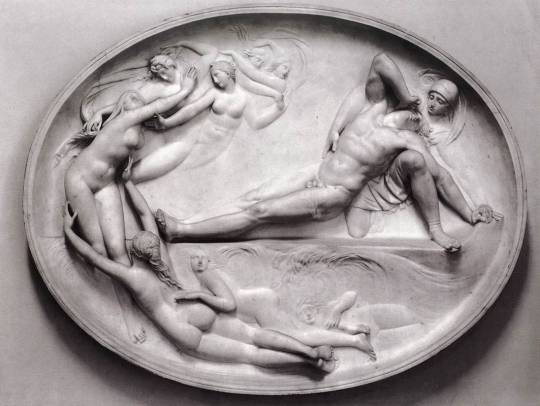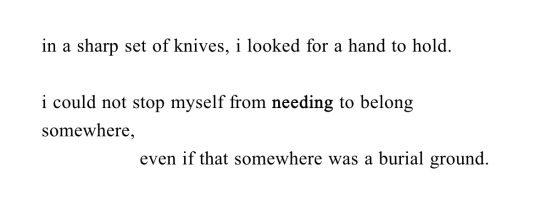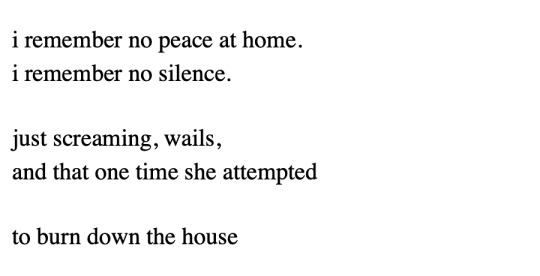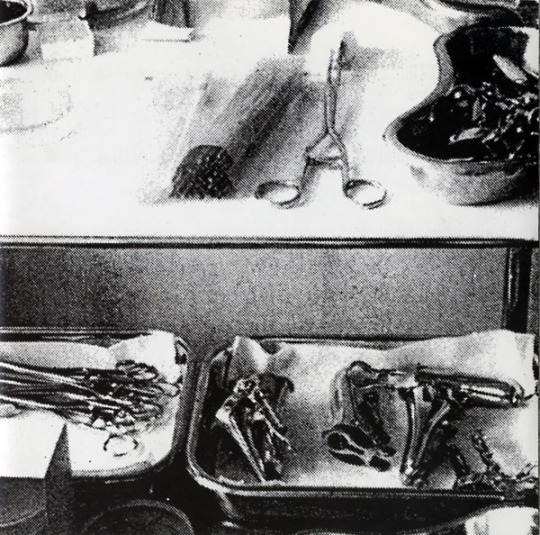Text

BANKS, Thomas
Thetis Rising from the Sea
1778
Marble, height 91,4 cm
Victoria and Albert Museum, London
139 notes
·
View notes
Text
Where is the mind, Arendt asks, when it withdraws from the world of appearances? It is “Nowhere”: “Though known to us only in inseparable union with a body that is at home in the world of appearances by virtue of having arrived one day and knowing that one day it will depart, the invisible ego is, strictly speaking, Nowhere.” According to Arendt, to truly think, we have to step away from the world of appearance and retreat into ourselves. Once this retreat is effected, we can pull the idea for contemplation into our mind. We move into our mind and out of the body — and there, away from others, and, in a sense, away from ourselves, we can truly practise thinking.
Cynthia Cruz, Disquieting: Essays on Silence
52 notes
·
View notes
Text
Guattari’s idea is both refreshing and profound. He suggests that when a person experiences psychosis, her psychosis changes according to her surroundings, and, therefore, treating her with fear by locking her up, keeping her in restraints, overmedicating her, and exposing her to other methods of suppression only serves to change her psychosis to a psychosis of fear and paranoia. Who, psychotic or not, in the same situation wouldn’t also feel terror and paranoia? Indeed, there is a legitimate reason to be paranoid and afraid. Further, the shock of being treated inhumanly, the sense of alienation and of betrayal, and, perhaps paramountly, the realization that humans can and do treat other humans in this way, is itself shocking and traumatizing. It is a shock and trauma that alters the psyche, changing the personality of the person who undergoes it.
Cynthia Cruz, Disquieting: Essays on Silence
1K notes
·
View notes
Text
Refusing to bind external appearance to internal function is paramount because when brought back to the study of philosophy, of life, and of language, it is essential to examine where meaning resides. Arendt writes that the philosopher must leave the world in order to think: “In order to find out what truly is, the philosopher must leave the world of appearances among which he is naturally and originally at home — as Parmenides did when he was carried upward, beyond the gates of night and day, to the divine way that lay ‘far from the beaten path of men,’ and as Plato did, too, in the Cave parable.” When the philosopher leaves the world of appearances, in a sense she disappears. And, Arendt writes, when the thinker thinks, she, too, disappears.
Cynthia Cruz, Disquieting: Essays on Silence
45 notes
·
View notes
Text

Double portrait, 1910. From the Budapest Municipal Photography Company archive.
54 notes
·
View notes
Text

fatima aamer bilal, excerpt from moony moonless sky’s ‘we were put on this earth desperate, hungry and willing.’
[text id: in a sharp set of knives, i looked for a hand to hold. / i could not stop myself from needing to belong somewhere, even if that somewhere was a burial ground.]
3K notes
·
View notes
Text
It seems to me that much of the misery we call and treat as depression today could be understood as melancholia. We may be experiencing a sense of melancholia in response to what we have lost in terms of the conversation surrounding our inner lives. Run by the pharmaceutical industry and insurance companies, most mental health treatment in the U.S. consists of short sessions of often short-term, often cognitive therapy and medication with the precise goal of returning the patient to efficient productivity. We have lost holistic treatment, and instead focus on managing the patient’s symptoms rather than finding their causes. [...] These messages that we are unfit, that our symptoms need to be eradicated rather than listened to, inform our emotional and psychic life — they contribute to our depression.
Cynthia Cruz, Disquieting
272 notes
·
View notes
Text
As humans are taken to be units of energy in industrialized societies, they will resist, whether they are conscious of this or not. Thus, much of what is today labelled depression could be understood as old-fashioned hysteria, in the sense of a refusal of current forms of mastery and domination. The more that society insists on the values of efficiency and economic productivity, the more depression will proliferate as a necessary consequence.
Darian Leader, The New Black: Mourning, Melancholia, and Depression
160 notes
·
View notes
Text
We are born in debt, owing the world a death. This is the shadow that darkens every cradle. Trauma is what happens when you catch a surprise glimpse of that darkness, the coming annihilation not only of the body and the mind but also, seemingly, of the world. Trauma is the savagery of the universe made manifest within us, and it destroys not only the integrity of consciousness, the myth of self-mastery, and the experience of time but also our ability to live peacefully with others, almost as if it were a virus, a pathogen content to do nothing besides replicate itself in the world, over and over, until only it remains.
David J. Morris, The Evil Hours
308 notes
·
View notes
Text
Virtually every survivor of trauma, whether or not they experience diagnosable post-traumatic stress, returns to the regular world and quickly recognizes that things are not as they were. People behave differently. There is an element of strangeness, a sense, often uncommunicated, of being marked by a kind of scarlet letter, even if one has not violated any moral code. In fact, in these situations, one’s degree of innocence or complicity in events can seem almost beside the point, as if one’s luck or simple fate is what is at stake. Often this change of perception is expressed in physical, spatial terms, as if the scope of what has transpired is so vast that it serves to alter one’s material position in the world.
David J. Morris, The Evil Hours
311 notes
·
View notes
Text

H.C. Goddard, "A Pre-Freudian Reading of The Turn of the Screw"
329 notes
·
View notes
Text
In love with death? An exaggeration to say, with Keats, half in love with easeful death: death liberated from dying. Then I have this fantasy: a gentle hemorrhage which flows from no specific point in my body, an almost immediate consumption, calculated so that I might have the time to abate my suffering without yet having died. Fleetingly I establish myself within a false conception of death (false the way a key is "falsified" by warping): I conceive of death beside me: I conceive of it according to an unthought logic, I drift outside of the fatal couple which links life and death by opposing them to each other.
Roland Barthes, A Lover's Discourse
134 notes
·
View notes
Text

Fariha Róisín, "ammu, after the smoke"
552 notes
·
View notes



